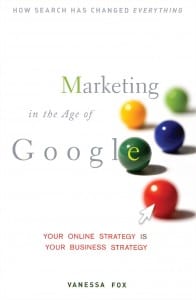 If the Internet were a sovereign government (which some may argue it is on the basis of its universal protocols and democratic access to information), the title of Secretary of State would have to go to Vanessa Fox.
If the Internet were a sovereign government (which some may argue it is on the basis of its universal protocols and democratic access to information), the title of Secretary of State would have to go to Vanessa Fox.
Not only does Vanessa seem to log as many air miles as the U.S. state department’s Hillary Clinton, shuttling between places like the Brandenburg Gate, Brazil, Boston and Bellevue to speak at seminars, user groups and conferences on any given day, but her “passport” bears the diplomatic stamp of authority as the long time Google ambassador to the Webmaster world and the co-creator of Google Webmaster Central. Vanessa was not only the voice and the face of Google WMC, the behind-the-scenes nerve center, knowledge base and well-instrumented dashboard for Web site owners, but was and is the closest thing to an ombudsman Google has ever known. Her statesmanship is as much a testament to her passion for teaching search engine knowledge as it is to her “easy-to-grok” communication and coaching skills.
When Vanessa stunned the SEO world by deciding to leave Google in June of 2007, stepping down from the throne of Google’s central webmaster court, the search world was abuzz with the possibility that the abdicating monarch would someday write a book that might “spill the beans,” exposing the closely guarded secrets behind the Web’s most impenetrable fortress.
 Would she divulge the secret ingredients of the Google algorithm? What about the access codes that could bring sudden search prominence, stature and glory for a site ranking highly on the Search Engine Results Pages (SERPs)?
Would she divulge the secret ingredients of the Google algorithm? What about the access codes that could bring sudden search prominence, stature and glory for a site ranking highly on the Search Engine Results Pages (SERPs)?
With the arrival of Marketing in the Age of Google, Why Your Online Strategy IS Your Business Strategy, Vanessa has delivered the goods alright, including, ironically, un-redacted sections entitled “How Search Engines Rank Results,” “How Search Engines are using Data About Searcher Intent” and ‘Getting Technical: How It All Comes Together,” all in unencrypted, plain english.
But even if she could possibly divulge the formula for the 400+ signals that were the secret passkeys to Google’s version of the Matrix during her tenure there, she makes clear: “The search engines’ algorithms are in a constant state of flux. Experts are tweaking settings every day to see how they can make results a little more relevant. If you spend your time “optimizing” your site for these algorithmic particulars, you’ll never have time to do anything else. A much better strategy is to focus on what the search engines are trying to achieve with al l of those algorithmic tweaks. this will not only get you ranking well, but will help you achieve what you’re really after – which is not ranking but customers.”
Marketing in the Age of Google is not, therefore, about how to tactically implement search engine optimization, but how to think strategically about search and understand how your business fits into a search-based culture. And yet, those who know there is a financial reward for higher search rankings and a dearth of misinformation being disseminated on the open market, will be gratified to find that each Chapter includes a Checklist of useful, practical and actionable steps every Website can take to translate their nique value and points of difference into improved search engine visibility.
Here are 10 sterling Stratagems, of hundreds that appear in the book, that will whet your appetite for Search if your are a Foodie for online marketing thoughts!
1. Online advertising triggers $6 to be spent offline for every dollar spent online, and the in-store sales boost from search is three times greater than online advertising. Organic search gets 85% of those clicks.
2. Should organic and paid search work together? Searchers were 42% more likely to recall a leading automative brand name when the brand appeared in both organic and paid results versus just the top organic listing.
3. According to a study at Penn State University, 60% of searchers rely primarily on the title of the search results when evaluating whether to click. Eye-tracking studies go one step further, showing that searchers look primarily at the left side of the title.
4. We can judge a site in as little as 50 milliseconds. The page the searcher lands on and how easily they can scan the page and recognize that it answers their query is important.
5. A Persona is a highly-detailed description of an individual who embodies the key goals and behaviors of an important group of target customers. Develop these searcher personas (using the techniques shown in the book) for your company’s offerings and match them with the search queries they will use in finding answers on your site.
6. Answer the following for every page on your site: What are you trying to accomplish with this page? What audience are you trying to attract? Will this page best satisfy that search? The answers will confirm if your content is effective in meeting the needs of your audience.
7. Paying attention to what search engines suggest for topics important to your business can give you insight into what your potential customers are really looking for.
8. Every page of the site is a potential entry page. Motivate the visitor to enter the acquisition funnel from wherever they land on your site with a compelling call to action.
9. Avoid hiring an unknown SEO firm that promises specific rankings or provides ranking reports as the main deliverable.
10. Every page on a Website should have at least one internal link and a listing in an XML Site Map, Ensure each page’s title element, meta description tag and H1 contain the vital keywords for the page.
One of the great ironies of any well-documented book on Search, is how the bibliography gives credit to the ideas and papers of other expert sources in the form of citations or references. That concept was the very foundation for Google’s pioneering PageRank algorithm. Vanessa’s bibliography is, indeed, definititve.
With Marketing in the Age of Google. the Google alumna who has gone on to found the consulting firm, Nine by Blue and serve as an Entrepreneur in Residence at Seattle’s Ignition Partners, demonstrates her unique ability to talk to site owners, Web content managers, and direct marketers as easily as she can to developers, programmers and engineers. Vanessa must have had the Google Webmaster Central language translator turned on for this ellucidating read, (including pig-latin and Klingon, for those so inclined.) As Buffy The Vampire Slayer’s biggest fan, Vanessa can surely appreciate that her first book is love at every Web marketer’s first bite. We can hardly wait for the next book from this keen observer of the Internet’s most compelling truth: Search has changed everything! [24×7]




















